Finding the appropriate shampoo is critical in our quest for healthy hair. As individuals become more conscious of the possible harm that harsh chemicals might inflict, the year 2024 will see an increasing demand for mild shampoos. We will decipher gentle shampoos in this complete guide, studying their benefits, components to search for, and strategies for developing beautiful, healthy hair.
Understanding the Concept of Mild Shampoos
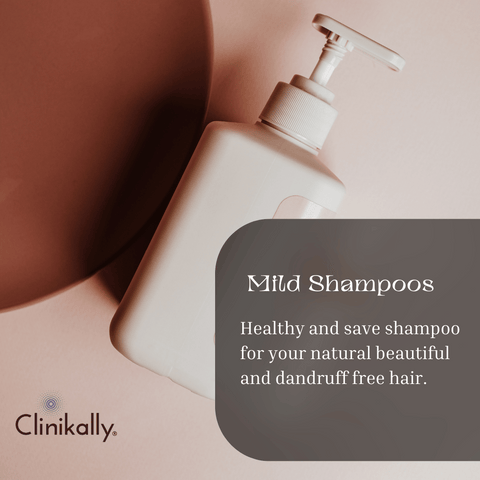
The idea behind light shampoos is to use gentler washing agents while avoiding harsh ingredients like sulfates, parabens, and synthetic perfumes. These shampoos place an emphasis on preserving the natural balance of the hair and scalp while properly washing the hair and removing dirt, excess oil, and product buildup. Mild shampoos' major purpose is to promote healthier hair by giving a gentler washing experience that does not strip away natural oils or upset the pH balance of the scalp. Mild shampoos serve to prevent dryness, frizz, breakage, and scalp irritation by retaining the moisture of the hair and minimizing potential harm.
Mild shampoos frequently contain natural or organic components like plant extracts, essential oils, and moisturizing agents that nourish the hair and scalp while also encouraging general health and vitality. They are appropriate for a wide range of hair types, including dry, damaged, and sensitive scalps, because they provide a softer and more pleasant cleansing experience. While mild shampoos are generally thought to be beneficial for hair health, individual outcomes may differ. Hair type, scalp condition, and personal preferences can all have an impact on the effectiveness and acceptability of a specific gentle shampoo for an individual. As a result, it's advisable to select a gentle shampoo depending on your specific hair and scalp demands, and then experiment to find the one that works best for you.
Defining Mild Shampoos: What Does It Mean?
When we talk about mild shampoos, we're talking about a type of hair-cleansing solution that is made with gentle components and is intended to be gentler on the hair and scalp than ordinary shampoos. The term "mild" denotes that these shampoos are less likely to cause damage, dryness, or irritation. Sulphates, parabens, synthetic scents, and colors are often avoided or minimized in mild shampoos. These substances, which are widely present in ordinary shampoos, can strip natural oils from the hair and disturb the scalp's natural pH balance, resulting in a variety of concerns such as dryness, frizz, and scalp irritation.
Mild shampoos are designed to provide a softer cleansing experience while successfully eliminating dirt, excess oil, and product buildup from the hair. They strive to maintain the natural moisture of the hair, safeguard its health, and provide a balanced scalp environment. Milder shampoos frequently use softer washing ingredients, such as sulfate-free surfactants or natural alternatives, to achieve this. These shampoos typically include nourishing components such as natural oils, botanical extracts, and moisturizing agents to provide hydration, nourishment, and protection to the hair and scalp. Mild shampoos are appropriate for a variety of hair types, including sensitive, dry, and damaged scalps. They help maintain the health, manageability, and general appearance of the hair by providing a calming and less irritable cleansing experience.
The Science Behind Mild Shampoos: pH Levels, Ingredients, and More
Understanding various elements, such as pH levels, ingredients, and their effects on the hair and scalp, is necessary to understand the science behind mild shampoos. Let us investigate these components in greater detail:
-
pH Levels: The pH level, which measures a substance's acidity or alkalinity, is very important for preserving the health of the hair and scalp. Healthy hair has a naturally acidic pH that ranges from 4.5 to 5.5. Regular shampoos typically have a higher pH, especially those that contain sulfates, which can disturb the pH balance that normally exists between the hair and scalp.
Mild shampoos are designed to have a pH level that is more similar to the pH of the hair and scalp, preserving the natural acid mantle. Mild shampoos assist in keeping the hair cuticles smooth, retaining moisture, and avoiding excessive dryness or oiliness by maintaining the proper pH balance.
-
Gentle Cleansing Agents: In comparison to regular shampoos, mild shampoos frequently use gentler cleansing agents or surfactants. Sulfates like sodium lauryl sulfate (SLS) and sodium laureth sulfate (SLES), which are efficient at removing oil and dirt, but can be harsh on the hair and scalp, are frequently found in traditional shampoos.
Sulfate-free or lower-foaming surfactants, like cocamidopropyl betaine or decyl glucoside, may be used in mild shampoos. These cleansing agents work more gently, which lessens the risk of removing natural oils and resulting in dryness.
-
Ingredients that Nourish and Moisturize: To balance out any potential drying effects of cleansing agents, mild shampoos frequently contain ingredients that Nourish and Moisturize. Natural oils (such as argan oil, coconut oil), botanical extracts (such as aloe vera, chamomile), and humectants (such as glycerin, panthenol) are a few examples of these ingredients.
Moisturizing agents help to hydrate and condition the hair, which enhances its softness, elasticity, and general health. They can also calm the scalp and relieve dryness or irritability.
-
Ingredients that are Natural or Organic: Mild shampoos may place an emphasis on using natural or organic ingredients while avoiding artificial fragrances, dyes, and other potentially harmful chemicals. The goal of this strategy is to reduce the chance of allergic reactions, scalp sensitivities, and environmental effects.
Natural components, such as plant extracts, herbal infusions, and essential oils, frequently offer extra advantages, such as enhancing scalp health, promoting hair growth serum, enhancing hair shine.
-
Targeted Formulations: Mild shampoos might also contain formulations that are specifically designed for certain hair types or issues. For instance, there are gentle shampoos made for sensitive skin, color-treated hair, dry or damaged hair, and scalps prone to dandruff. These formulations might include particular ingredients to cater to those specific requirements and produce the best outcomes.
You can choose products that are appropriate for your hair and scalp needs by being informed about the science behind mild shampoos. pH levels, cleaning agents, moisturizing ingredients, and any custom formulations made to address your hair concerns are important considerations.
The Role of Mild Shampoos in Hair Health
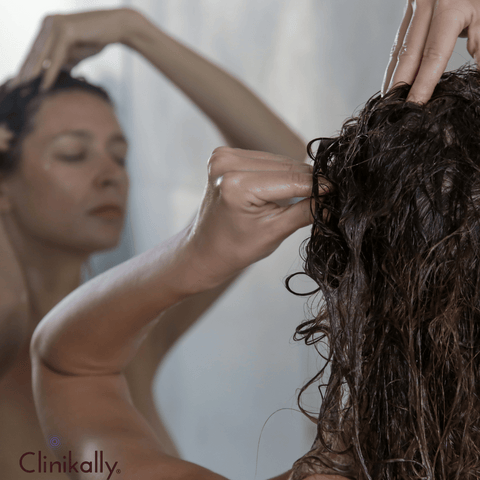
Mild shampoos are essential for maintaining healthy hair because they gently cleanse while causing the least amount of harm to the hair and scalp. These are some essential facets of their job:
-
Gentle Cleaning: Mild shampoos are made with mild surfactants that remove dirt and oil from the hair and scalp without overly stripping the natural oils. They eliminate product buildup, oil, and dirt without leaving skin dry or irritated.
-
pH Balance: The pH of the scalp is generally between 4.5 and 5.5, making it slightly acidic. The overall health of the scalp and hair depends on maintaining this acidic pH balance, which is why mild shampoos are created. They aid in maintaining closed hair cuticles, which produce smoother, shinier, and less frizzy hair.
-
Retaining Moisture: Using harsh shampoos can strip the hair of its natural oils, causing breakage and dryness. Mild shampoos are designed to keep the hair moist, preventing it from getting too dry or brittle. They aid in preserving the hair's normal levels of hydration, leaving it supple and manageable.
-
Scalp Health: For healthy hair growth, a healthy scalp is necessary. The harsh chemicals like sulfates and parabens that can irritate the scalp and cause dryness or inflammation are typically absent from mild shampoos. Mild shampoos support healthy, nourished scalps, which benefits the health of the hair as a whole.
-
Safe for Frequent or Daily Use: Mild shampoos are typically safe for frequent or daily use. Unlike stronger clarifying shampoos or medicated shampoos that are meant for specific hair or scalp conditions, mild shampoos are gentle enough to be used regularly without causing damage or excessive dryness.
It is important to remember that a shampoo's effectiveness also depends on a person's hair type and individual concerns. While mild shampoos are effective for the majority of people, those with particular scalp issues or excessive oiliness may benefit from shampoos made with their needs in mind.
The Importance of Mild Shampoos for Different Hair Types
For various hair types, mild shampoos are essential because they provide advantages unique to each type. The significance of gentle shampoos for various hair types is discussed below:
-
Normal Hair: Mild shampoos are perfect for normal hair because they gently cleanse without excessively removing natural oils. They help maintain the hair's moisture balance, keeping it healthy, soft, and manageable.
-
Dry Hair: Since mild shampoos are made to keep moisture in the hair, they are essential for dry hair types. By hydrating and nourishing the hair, these shampoos help to stop further dryness and breakage. To give dry hair more hydration, look for mild shampoos that include moisturizing components like glycerin, aloe vera, or natural oils.
-
Oily Hair: For oily hair types, mild shampoos that thoroughly cleanse the scalp and hair without overstimulating the sebaceous glands are beneficial. A scalp depleted of oil due to harsh shampoos may respond by producing even more oil. Mild shampoos balance oil production and leave hair feeling clean and fresh without over-drying it.
-
Fine or Thin Hair: Mild shampoos are kind to fine or thin hair, which is more delicate and vulnerable to damage. They clean the hair without clogging the follicles or contributing to further thinning. Mild shampoos formulated with volumizing ingredients such as proteins or polymers can help fine hair gain body and texture.
-
Color-Treated Hair: Color-treated hair requires gentle shampoos to maintain the vibrancy and longevity of the color. Harsh shampoos can cause color to fade faster and damage to chemically treated hair. Mild shampoos designed specifically for color-treated hair help to protect the color, retain moisture, and prevent color fading.
-
Sensitive Scalp: Gentle shampoos can help people with sensitive or easily irritated scalps. These shampoos contain no harsh chemicals, fragrances, or irritants that can aggravate scalp conditions such as dermatitis or psoriasis. They provide gentle cleansing while also soothing the scalp and alleviating discomfort.
Mild shampoos, in general, are a safe and effective alternative for most hair types, providing gentle washing while also maintaining hair health. However, individual hair concerns must be considered, and a mild shampoo that addresses specific needs, such as dryness, oiliness, or sensitivity, must be chosen. A consultation with a hair care professional or dermatologist can offer you personalized recommendations based on your individual hair type and issues.
Benefits of Using a Mild Shampoo
Using gentle shampoo can help your hair and scalp in a variety of ways. Here are some of the primary benefits of using a gentle shampoo:
-
Gentle Cleansing: Gentle shampoos effectively cleanse the hair and scalp without being harsh or stripping away excessive natural oils. They remove dirt, sweat, and product buildup while preserving the natural moisture balance of the hair.
-
Retains Natural Oils: Unlike harsh shampoos, which can strip away your hair's natural oils, mild shampoos help to retain these oils, preventing your hair from becoming overly dry or brittle. This aids in the preservation of the hair's natural hydration and overall health.
-
Reduces Scalp Irritation: Mild shampoos are free of harsh chemicals that can irritate the scalp, such as sulfates and parabens. By avoiding these irritants, mild shampoos encourage a healthier scalp environment and help reduce scalp dryness, itching, and inflammation.
-
Reduces Hair Damage: Rubbing your hair with harsh shampoos can damage the cuticles, resulting in frizz, breakage, and split ends. Mild shampoos are made to be kinder to hair, reducing damage and maintaining smooth, manageable hair strands.
-
Suitable for Daily Use: Mild shampoos are generally safe for daily use, including daily washing if desired. Their gentle formulation makes them ideal for people who prefer to wash their hair frequently without worrying about excessive dryness or damage.
-
Color-Treated Hair: If you have color-treated hair, using a gentle shampoo is especially important. Harsh shampoos can remove color and cause it to fade rapidly. Mild shampoos, on the other hand, are gentler on the hair and aid in the preservation of color vibrancy and longevity.
-
Suitable for All Hair Types: Mild shampoos are generally appropriate for many hair types, including normal, dry, oily, and sensitive hair. They offer a mild and balanced cleansing experience that is not harsh on diverse hair textures or conditions.
Choosing the Right Mild Shampoo for Your Needs
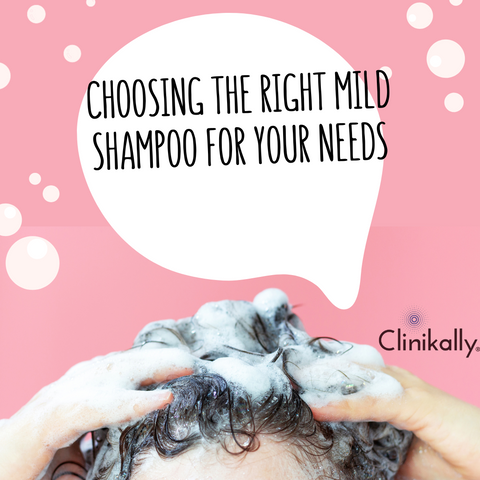
Choosing the best mild shampoo for your needs necessitates taking into account your hair type, specific concerns, and personal preferences. Here are some things to think about when choosing a gentle shampoo:
-
Hair Type: Take into account the type of your hair, including whether it is normal, dry, oily, fine, thick, curly, or colored. The best results can be obtained by selecting a mild shampoo that is suited to your hair type because different hair types have different needs.
-
Ingredients: Seek out gentle shampoos that do not contain harsh sulfates like sodium lauryl sulfate (SLS), like sodium lauroyl sarcosinate or coco-glucoside. Avoid shampoos with ingredients like fragrances or synthetic colors that could irritate your scalp. Consider any specific ingredients that address your hair concerns as well, such as ingredients that moisturize dry hair or add volume to fine hair.
-
Concerns regarding the scalp: If you have a sensitive or troublesome scalp, pick a mild shampoo made especially for sensitive scalps or one that is free of irritants like sulfates, parabens, and fragrances. Look for ingredients that can calm the scalp, such as aloe vera or chamomile.
-
Specific Concerns: Consider any specific concerns you may have, such as dandruff, itchiness, or damage. Look for shampoos with mild ingredients that address these issues, such as anti-dandruff shampoos or shampoos with repairing properties. These specialized formulas can assist in addressing your specific hair and scalp requirements.
-
Product Reviews: Read product reviews and testimonials from other users to gain an understanding of the efficacy and performance of various mild shampoos. Real-world experiences can reveal how well shampoo works for various hair types and concerns.
-
Trial and Error: It takes some trial and error to find the best mild shampoo. It may take a few different brands or formulations to find the one that works best for your hair. Do not be discouraged if the first one you try does not work perfectly - this is all part of the learning process.
-
Professional Advice: If you are unsure about which mild shampoo to use, consult a hairstylist or dermatologist. They can assess the condition of your hair and scalp and make personalized recommendations based on their knowledge.
Identifying Mild Shampoo Ingredients
When choosing a gentle and nourishing shampoo, knowing the ingredients that make up mild shampoo can help you make an informed decision. The following are some typical ingredients in mild shampoo to look for:
-
Gentle Surfactants: Mild shampoos typically contain gentle surfactants that cleanse the hair and scalp without causing excessive dryness or irritation. Ingredients to look for include sodium lauroyl sarcosinate, coco-glucoside, decyl glucoside, and sodium cocoyl isethionate.
-
Natural Oils and Extracts: Mild shampoos frequently contain natural oils and extracts that nourish and hydrate the hair. Coconut oil, argan oil, jojoba oil, almond oil, olive oil, shea butter, aloe vera, chamomile extract, and lavender oil are some examples.
-
Moisturizing Agents: Ingredients that aid in the retention of moisture in the hair are beneficial in mild shampoos, especially for dry or damaged hair. Look for moisturizing agents such as glycerin, panthenol (provitamin B5), honey, or hyaluronic acid.
-
Botanical Extracts: Botanical extracts are commonly found in mild shampoos and are known for their soothing and conditioning properties. These may include chamomile, rosemary, green tea, calendula, or witch hazel extracts.
-
Proteins: Because proteins can help strengthen and repair hair, they are good ingredients for gentle shampoos. Look for ingredients like hydrolyzed wheat protein, silk protein, or keratin protein.
-
pH-Balancing Ingredients: Mild shampoos frequently contain chemicals that help maintain the scalp's natural pH balance, supporting healthier hair. Citric acid, lactic acid, and apple cider vinegar are examples of these.
-
Essential Oils: Some mild shampoos include essential oils because of their aromatic properties and potential benefits to the hair and scalp. Lavender, tea tree, peppermint, and rosemary are common essential oils found in mild shampoos.
How to Choose a Mild Shampoo Based on Your Hair Type
Choosing a mild shampoo that is appropriate for your hair type is critical for maintaining its health and addressing specific issues. Here are some recommendations for mild shampoos based on hair type:
-
Normal Hair:
-
Look for a gentle shampoo that cleans gently without removing too many natural oils.
-
Consider using a shampoo that contains nourishing ingredients such as botanical extracts or natural oils to keep your hair healthy and shiny.
-
Dry Hair:
-
To hydrate and nourish the hair, use a gentle shampoo with moisturizing properties.
-
Look for ingredients that help retain moisture and combat dryness, such as coconut oil, shea butter, or glycerin.
-
Consider sulfate-free formulations, which are less likely to cause additional dryness.
-
Oily Hair:
-
Choose a gentle shampoo that cleans the scalp and hair without stimulating excessive oil production.
-
To remove excess oil and buildup, look for shampoos with clarifying properties.
-
Consider lightweight formulations that will not weigh down or leave a residue on the hair.
-
Fine or Thin Hair:
-
Choose a gentle shampoo that will add volume and body to fine or thin hair.
-
Look for volumizing shampoos that add lift and texture to the hair without weighing it down.
-
Consider shampoos that contain proteins or polymers to help plump the hair strands.
-
Color-Treated Hair:
-
Choose a mild shampoo specifically formulated for color-treated hair to preserve the vibrancy and longevity of the color.
-
Look for sulfate-free shampoos with color-protecting ingredients such as UV filters or antioxidants.
-
Consider shampoos that contain gentle cleansing agents that will not remove the color.
-
Curly or Coarse Hair:
-
Choose a gentle shampoo that will hydrate and moisturize curly or coarse hair.
-
Search for shampoos that contain moisturizing ingredients such as shea butter, coconut oil, or aloe vera.
-
Consider sulfate-free products that will not dry out or frizz your hair.
-
Sensitive Scalp:
-
Choose a shampoo that is gentle on the scalp and free of irritants and harsh chemicals.
-
Look for ingredients like aloe vera, chamomile, or tea tree oil to soothe and balance the scalp.
-
If you have known sensitivities, look for fragrance-free and hypoallergenic options.
Considerations and Precautions When Using Mild Shampoos
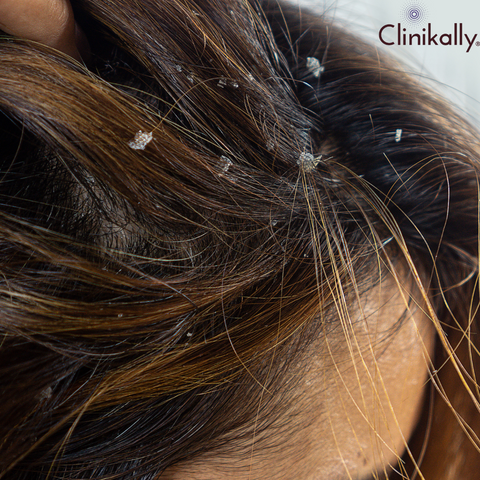
While mild shampoos are generally gentle and safe to use, there are a few things to keep in mind:
-
Allergies or Sensitivities: Even gentle shampoos can contain ingredients that cause allergic reactions or scalp sensitivities in some people. If you have a known allergy or sensitivity to certain ingredients, read the ingredient list carefully and avoid products containing those ingredients. If you are unsure about the suitability of a new shampoo for your skin or scalp, perform a patch test before using it.
-
Dilution and Amount: Because mild shampoos are often concentrated, it is critical to follow the amount instructions. Diluting the shampoo with water can result in even gentler cleaning. Excessive shampooing can cause residue buildup and weigh down the hair.
-
Use: While mild shampoos are typically suitable for frequent or daily use, it is important to consider your particular hair type and needs. Less frequent shampooing may be beneficial for some hair types because over-washing can remove natural oils and cause dryness. Depending on the requirements of your hair, change how often you shampoo.
-
Complement with Conditioner: Specialized conditioners often offer more conditioning and moisture than mild shampoos because they concentrate on gentle cleansing. It's recommended to use a compatible conditioner or follow up with a conditioner that suits your hair type to provide additional nourishment and hydration.
-
Individual Hair Issues: Mild shampoos might not be able to treat particular hair issues like dandruff, scalp issues, or excessive oiliness. Consider using targeted shampoos if you have particular worries, or ask a dermatologist or trichologist for the best course of action.
-
Residue Buildup: Although mild shampoos are designed to reduce residue buildup, some buildup may still occur over time with some hair types or styling products. If you notice buildup or heaviness in your hair, think about using a clarifying shampoo on a regular basis to get rid of it and bring back the freshness.
-
Environmental factors: Strong pollutants or certain styling products may be more difficult to remove with mild shampoos. In these situations, occasionally washing your hair and scalp with a clarifying or deep-cleansing shampoo can help.
If you have specific questions or worries about using mild shampoos, always seek advice from a dermatologist or hair care specialist. Based on your hair type, scalp health, and particular requirements, they can offer tailored suggestions and advice.
Potential Drawbacks or Limitations of Mild Shampoos
Although mild shampoos have many advantages, it is crucial to be aware of any potential drawbacks or restrictions:
-
Cleaning Power: Milder, clarifying shampoos might not offer as thorough a clean as more potent, stronger shampoos. A mild shampoo may not completely eliminate all residues if you frequently use heavy styling products, have excessive product buildup, or live in an area with high pollution levels.
-
Oil and Grease Removal: Mild shampoos might not be as effective at getting rid of excess oil and grease if your hair or scalp are extremely oily. In these situations, a more potent shampoo or one made especially for oily hair may be required to achieve a thorough clean.
-
Residue Buildup: Mild shampoos work to reduce residue accumulation, but some formulations or hair types may continue to do so over time. The hair may appear heavy, dull, or lackluster as a result. Utilizing clarifying shampoos on a regular basis can help remove buildup and bring back the freshness of your hair.
-
Scalp Conditions: Some scalp conditions, such as dandruff, seborrheic dermatitis, or psoriasis, may be difficult to treat with mild shampoos. These conditions frequently call for specialized shampoos with therapeutically effective active ingredients. If you have any concerns about your scalp, speak with a dermatologist or trichologist.
-
Lather and Foam: When compared to more potent, sulfate-based shampoos, mild shampoos typically produce less lather and foam. Although lather does not always indicate cleaning effectiveness, some people might equate a lack of lather with insufficient cleaning, which can affect how effective they think a shampoo is.
-
Hair Texture and Styling: Mild shampoos might not give your hair the texture, hold, or control that you want for a particular hairstyle. You might need additional styling products or a shampoo made for your needs if you depend on stronghold or particular styling effects.
When assessing the restrictions of mild shampoos, it is important to take your particular hair type, concerns, and lifestyle into account. Mild shampoos can occasionally be used in conjunction with other hair care products to address specific problems or produce desired results. A dermatologist or hair care specialist can give you individualized recommendations based on your particular requirements.
Safety and Precautions for Mild Shampoo Users
Although it is generally safe to use mild shampoos, it is crucial to be aware of the following safety measures:
-
Patch test: Before using a new mild shampoo on your entire scalp and hair, it is advised to conduct a patch test on a small area of your skin. To test for any negative reactions or allergies, apply a small amount of shampoo to a small area of the skin, preferably behind your ear or on the inside of your wrist, and wait 24 hours.
-
Avoid Getting Shampoo in Your Eyes: Be careful when washing your hair to avoid getting shampoo in your eyes. If the shampoo does get in your eyes, you should immediately thoroughly rinse them with water.
-
Read and Follow Instructions: Always read the manufacturer's instructions on the shampoo bottle or packaging. Follow the recommended usage instructions, including the amount to use and the length of time you should leave the shampoo on your hair, if applicable.
-
Rinse thoroughly: After shampooing, make sure to thoroughly rinse your hair to remove any residue and ensure that no shampoo is left on your scalp or hair. Residual shampoo can potentially cause scalp irritation or dryness.
-
Refrain from Using If Irritation Occurs: If you experience any scalp itchiness, redness, or irritation after using a mild shampoo, stop using it right away. If the signs and symptoms continue or get worse, seek the advice of a dermatologist or other medical specialist.
-
Keep Your Mild Shampoo and Other Hair Care Products Away From Children: Keep Your Mild Shampoo and Other Hair Care Products Away From Children. To avoid misuse or accidental ingestion, make sure to store things properly.
-
Individual Sensitivities: Different ingredients cause different reactions on different people's skin and scalp. You should carefully review the shampoo's ingredient list and steer clear of products that contain any ingredients to which you are known to be allergic or sensitive.
-
Consult a Professional: It is advised to speak with a dermatologist or trichologist if you have any questions about the use of mild shampoos, allergies, or specific scalp conditions. They can offer you individualized guidance based on your particular needs and assist you in selecting the best products for your hair and scalp.
By taking these safety precautions, you can use mild shampoos with confidence and safety. Always seek advice from a qualified professional if you have any worries or questions.
Exploring Top Mild Shampoo Brands and Products
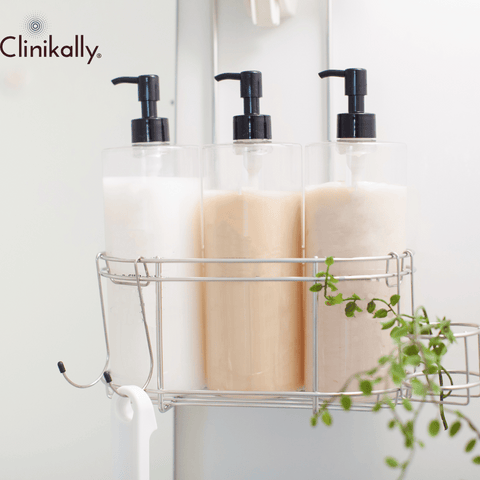
There are several top mild shampoo brands and products available on the market. Here are a few popular options known for their gentle formulations:
These are just a few of the mild shampoo brands and shampoos on the market. When choosing a shampoo, keep in mind your hair type, specific concerns, and personal preferences. To select the best gentle shampoo for your needs, study reviews and seek suggestions from trustworthy sources or professionals.
Recommendations: Top Mild Shampoos in 2024
Here are some top picks, which are based on the popularity and glowing reviews of mild shampoos in recent years:
-
Neutriderm Hair Enhancer Shampoo: Deeply cleanse and freshen your hair and also nourish your scalp with the power of natural ingredients in Neutriderm Hair Enhancer Shampoo to reduce hair fall and prevent hair loss.
-
Aclaris Follicapil Shampoo + Follicapil Topical Solution: Accelerate your hair growth fast and effectively prevent hair fall with the hair growth treatment combination of Aclaris Follicapil Shampoo + Follicapil Topical Solution.
-
Ducray Anaphase+ Anti-Hair Loss Complement Shampoo: Effectively fight hair fall and prevent hair fall with the Ducray Anaphase+ Anti-Hair Loss Complement Shampoo. Its formula contains vitamins and nutrients that help preserve the strength and vitality of the hair while adding volume and shine.
-
Sesderma Seskavel Growth Anti-Hair Loss Shampoo: Effectively fight hair loss with Sesderma Seskavel Growth Anti-Hair Loss Shampoo. With an advanced formula containing ingredients that stimulate hair growth and prevent hair loss, the anti-hair loss shampoo helps you achieve your ideal hair. Sabal extract will moisturize, soften, condition, soothe, and decrease hair loss. The shampoo also improves blood circulation in the scalp and thus activates hair growth. Its antioxidants also help to reduce excess sebum and alopecia.
-
Renocia Hair Revitalizing Shampoo: Clinically proven formula that helps promote longer, thicker, and healthier hair. Renocia Hair Revitalizing Shampoo is designed to stimulate and fortify the hair and scalp, creating a healthy environment for hair restoration.
When choosing a mild shampoo, keep your hair type, concerns, and preferences in mind. It's also a good idea to keep an eye out for any upgrades or new product launches from renowned hair care firms to locate the most up-to-date solutions in 2024.
Expert Opinions: Dermatologist-Recommended Mild Shampoos
These recommendations are based on dermatologists' expertise and the ingredients used in the products. However, it's always best to consult with a dermatologist for personalized advice. Dermatologists have previously recommended the gentle shampoos listed below:
Please keep in mind that these suggestions are based on general observations and may not apply to everyone. Consider your specific hair and scalp condition and consult with a dermatologist for personalized recommendations tailored to your specific needs.
Conclusion: Embracing Mild Shampoos for Healthier, Happier Hair

Using gentle shampoos will help you maintain healthier, happier hair. These gentle formulations cleanse the hair and scalp while reducing irritation, dryness, and damage. You can enjoy the following benefits by selecting the proper mild shampoo for your hair type and needs:
-
Gentle Cleaning: Mild shampoos thoroughly clean the hair and scalp without removing important oils or making the hair or scalp feel overly dry. They maintain the hair's natural moisture balance while removing dirt, extra oil, and product buildup.
-
Scalp Care: People with sensitive scalps or those who are prone to scalp conditions like dryness, itching, or irritation should use mild shampoos. They support a healthier environment for hair growth by soothing and nourishing the scalp, which lessens discomfort.
-
Hair Health and Hydration: You can safeguard and improve the health of your hair by using gentle shampoos. These shampoos frequently include hydrating components that aid in nourishing and hydrating the hair, promoting softness, smoothness, and shine.
-
Compatibility with Different Hair Types: Mild shampoos are available in formulas tailored to specific hair types, such as dry, damaged, oily, or color-treated hair. You may address your hair's specific needs and maintain its health and look by using a mild shampoo tailored to your hair type.
-
Overall Hair and Scalp Well-being: Including mild shampoos in your hair care routine can help improve the general health of your hair and scalp. They provide a soft and caring experience, decreasing inflammation, creating a balanced scalp, and assisting in the attainment of healthier, more manageable hair.
When choosing a gentle shampoo, keep your hair type, concerns, and preferences in mind. To maximize the benefits of using mild shampoos, it's also crucial to follow a consistent hair care routine that includes appropriate conditioning, frequent trims, and a healthy lifestyle. If you have any concerns about your hair or scalp, it is always best to seek personalized advice and recommendations from a dermatologist or hair care professional. Using gentle shampoos can help you nurture and care for your hair, resulting in healthier, happier, and more beautiful locks.
















